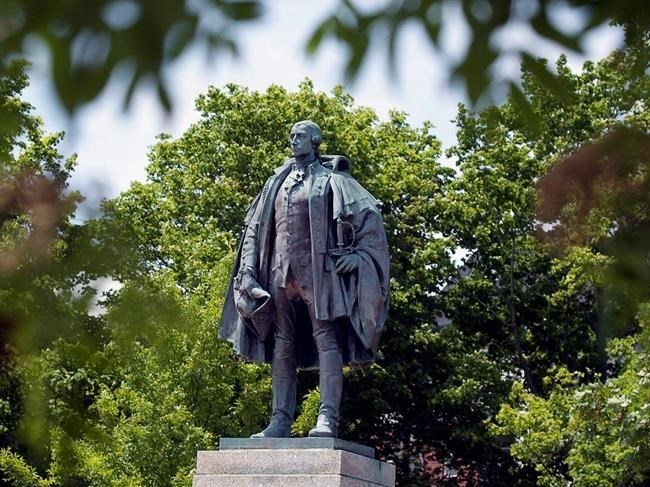
A statue of Edward Cornwallis stands in a Halifax park on Thursday, June 23, 2011. The debate over whether to knock statues of controversial figures off their pedestals has erupted again in Canada, as history writers and academics in two cities differ over how the present should influence the honouring of the past.
Image Credit: THE CANADIAN PRESS/Andrew Vaughan
December 16, 2015 - 6:00 AM
HALIFAX - The debate over whether to knock statues of controversial figures off their pedestals has erupted again in Canada, as history writers and academics in two cities differ over how the present should influence the honouring of the past.
The fight over monuments was revived recently in Nova Scotia when the province's premier said he'd like to meet with Halifax's mayor about a figure of Edward Cornwallis that towers over a south end park.
The plaque notes that Cornwallis founded the city in the 1700s, but doesn't mention a scalping proclamation he issued against the Mi'kmaq which promised "a reward of ten Guineas for every Indian Micmac taken or killed, to be paid upon producing such Savage taken or his scalp."
Some historians, such as David Bercuson at the University of Calgary, caution against judging the actions of the past with the standards of the present.
But Jon Tattrie, the author of Cornwallis: the violent birth of Halifax, says he counts himself among Canadians who want to see a more diverse depiction of their past in public spaces.
"Shouldn't our publicly funded art be about education and not about propaganda from one point of view? It's about wanting more voices heard and more perspectives woven together," he said.
"Really, the solitudes that our generation is charged with bridging is between European cultures and First Nations cultures."
He said he's sympathetic to the perspective of Daniel Paul, a Mi'kmaq elder and author who has argued the monument should be shifted from its position in the centre of the city into a military museum on Citadel Hill.
Premier Stephen McNeil, who is also the minister of aboriginal affairs, has said the Liberal government will work with municipalities and the Mi'kmaq "to ensure that our history is reflected, but done so in a respectful way."
In Ontario, the discussion has centred around the installation of a series of statues of prime ministers on the campus of Sir Wilfrid Laurier University.
Jonathan Finn, a faculty member leading the charge against the project, says a group of students and academics object to the project for a variety of reasons, including the record of Sir John A. Macdonald regarding aboriginal Canadians.
The final report of the Truth and Reconciliation Commission of Canada concluded that Macdonald's government espoused policies of "cultural genocide" that separated many aboriginal children from their families.
"This is a program of representation that does something, in celebrating only white males, that we've moved away from decades and decades ago," said Finn.
A spokeswoman for the university said in an email that an advisory committee is reviewing options for the project and will present its findings to the board of governors.
Lori Chalmers Morrison says that when the project received initial approval, it considered the possibility of extending the project to other leaders, including aboriginal and female role models from history.
Bercuson, who teaches at the University of Calgary, says he's wary of assessing past misdeeds through a modern lens.
"It is a difficult yardstick to measure people's actions by. We have to be extremely careful about how we want to cleanse our history," he said in an interview.
"I'm Jewish. What do I do about John A. Macdonald? He was a vicious anti-Semite. Am I advocating that his name be chiselled off of buildings and we take him off our money, no I'm not."
"We have to study him for what he was. See him in the fullness of his existence and draw our own conclusions about what kind of person he was. We have to remember he helped to build the country."
John Boileau, a former military officer and the author of several books of military history, has attended Tattrie's public talks on his Cornwallis book and criticized his viewpoint.
"I think they should leave well enough alone," he says. "The warfare ... was brutal. Men, women and children were killed on both sides," he said in an interview.
Boileau said one of his greatest concerns is over where the push to remove historical monuments will end.
"(George) Washington owned slaves. (Thomas) Jefferson owned slaves. Are you going to knock their faces off various bills?"
News from © The Canadian Press, 2015